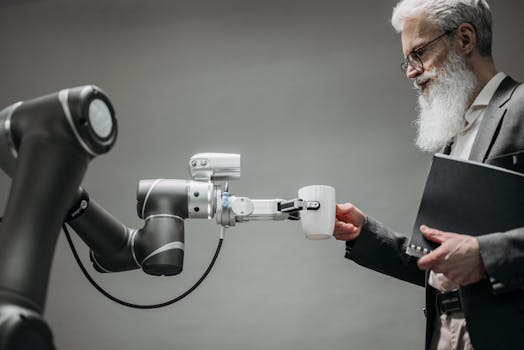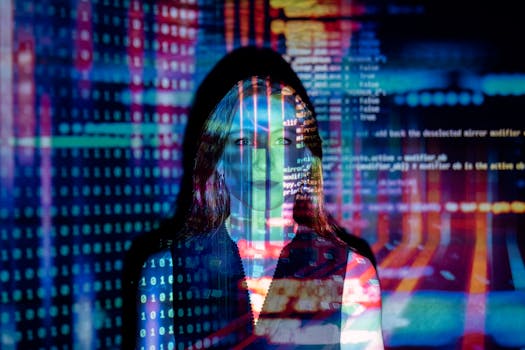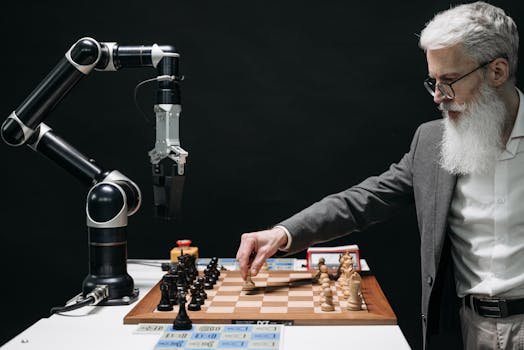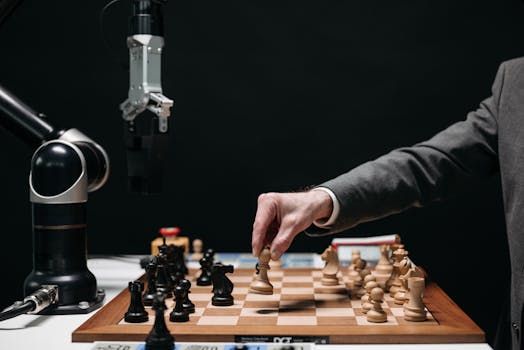1. Introduction
Artificial Intelligence, or AI, is rapidly changing the world we live in. In simple terms, AI refers to the ability of machines to perform tasks that would normally require human intelligence to complete. This can range from basic tasks such as recognizing patterns in data to more complex tasks such as understanding natural language and even predicting human behavior. The history of AI can be traced back to the mid-20th century, when scientists began exploring the possibilities of creating machines that could mimic human intelligence. One of the earliest examples of AI was the development of the computer program, Eliza, which was created in the mid-1960s to simulate a conversation with a human therapist. Since then, AI has come a long way, with major breakthroughs in fields such as machine learning, deep learning, and natural language processing. Today, AI is becoming increasingly important in the modern world. In the healthcare industry, AI is being used to develop new treatments and cures for diseases, to analyze medical images for diagnoses, and to monitor patients in real-time. In the manufacturing industry, AI is being used to automate production processes, increase efficiency, and reduce costs. In finance, AI is being used to detect fraudulent activity, to analyze customer data, and to create personalized investment strategies. In retail, AI is being used to improve customer experiences, to predict purchasing behavior, and to optimize supply chain management. Despite the many advantages of AI, there are also concerns about its impact on society. One of the main concerns is that AI will lead to job losses, as machines replace humans in certain tasks. There are also concerns about AI being misused, with the potential for machines to cause harm if not properly regulated. However, there are also many potential benefits of AI, including increased efficiency and productivity, cost savings, and the ability to handle complex tasks that would be difficult for humans to do alone. Looking to the future, AI is predicted to continue to grow and become an even more important part of our daily lives. It will change the way we work, live, and interact with each other. However, it is also important to carefully consider the ethical implications of AI and ensure that it is used in a responsible and safe manner. The role of humans in AI will remain important, as machines cannot replace human intuition, creativity, and empathy. Collaboration between humans and AI will be key to unlocking the full potential of this powerful technology.

2. The Impact of AI on industries
Artificial Intelligence (AI) is not just a buzzword or a passing trend in the tech space; it has already made significant impacts on various industries across the globe. From healthcare to manufacturing to retail, AI has changed the way businesses operate and made them more efficient than ever before. In this section, we will explore the impact of AI on some of the major industries and discuss how it is transforming the landscape of their operations. One of the significant impacts of AI has been on the healthcare industry. AI-based algorithms and machine learning models can analyze vast amounts of medical data and help doctors in making more accurate and informed decisions regarding treatment plans. For example, AI-powered medical imaging tools can assist radiologists in detecting early signs of cancer or other critical diseases. AI-powered chatbots can also help patients with basic medical advice, reducing the workload on doctors and nurses. Similarly, AI is also transforming the manufacturing industry by improving the production process and making it more cost-effective. AI-based systems can gather and analyze data from various interconnected devices and utilize it to optimize the production process by reducing downtime and minimizing errors. In addition, AI can also detect potential quality issues before they become serious, which can save the company a significant amount of money in recalls and product defects. The finance industry is also benefiting from the integration of AI technologies. AI is utilized for fraud detection and prevention, risk management, trading algorithms, and customer service. By automating repetitive tasks and extracting insights from historical data, AI is enabling financial institutions to make smarter and more precise decisions in real-time. Last but not least, AI is having a significant impact on the retail industry. Online shopping has become the norm, and retailers are increasingly relying on AI technologies to personalize user experiences, optimize supply chains, and prevent fraud. For instance, AI-powered recommendation engines provide customers with tailored product suggestions based on their purchase history and browsing behavior. AI can also assist in predicting inventory levels and demand, thus ensuring that retailers have the right amount of stock at any given time. In conclusion, AI has already proven to be a game-changer in several industries, and its influence is only set to grow in the future. From improving healthcare outcomes to increasing efficiency in manufacturing and transforming customer experiences in retail, AI is transforming the way businesses operate. However, it is also essential to recognize the potential downsides of AI and proactively address ethical concerns related to its implementation. Overall, the impact of AI on various industries is exciting, and the future possibilities are endless.

3. The Pros and Cons of Artificial Intelligence
Artificial Intelligence (AI) has been making waves in every sphere of life, from healthcare to finance to manufacturing. The ever-increasing rate of technological advancement has led to more and more industries adopting AI in some form or the other. However, like every other technology, AI has its fair share of advantages and disadvantages. Advantages of Artificial Intelligence The primary advantage of AI is increased efficiency and productivity. Machines are not prone to human errors and do not require breaks, rest, or sleep. They can work 24/7, processing and analyzing data at a much faster pace than humans. AI can also handle complex tasks that would be too difficult, time-consuming, or even impossible for humans to perform. For instance, AI algorithms have been successfully employed to predict equipment failure rates in manufacturing plants, saving the cost of manual inspection, and reducing downtime. Another advantage of AI is cost savings. Once an AI system has been implemented, it typically requires minimal to no human intervention, which translates into lower labor costs. Additionally, AI can help identify inefficiencies in operations, enabling businesses to cut down on waste, optimize supply chains, and save costs. Disadvantages of Artificial Intelligence One of the biggest concerns around AI is job loss. As AI and automation become more prevalent across different industries, there is a risk of human workers being replaced by machines. Some jobs that might be at risk of automation include manufacturing jobs, transportation jobs, and low-skill jobs in the retail and service sector. Another disadvantage of AI is the lack of creativity. While machines can perform tasks efficiently and accurately, they lack the ability to come up with new and innovative ideas. Creativity is a uniquely human trait, and while AI can be used to process data and come up with solutions, it cannot invent or innovate. The misuse of AI is yet another concern. AI is only as good as the data it has been trained on. If the data is biased or incomplete, the AI system will make inaccurate predictions or decisions. There is also the risk of malicious actors using AI for harmful purposes, such as developing autonomous weapons. In conclusion, while AI has numerous advantages, its disadvantages cannot be ignored. The key is to strike a balance between the benefits and risks of AI and ensure that it is used for the greater good. It is important to have regulations in place to monitor the development and use of AI, and to ensure that ethical considerations are taken into account in its design and implementation. Ultimately, AI should be seen as a tool to augment human intelligence, rather than a replacement. Human judgment, intuition, and creativity are crucial to ensuring the ethical and responsible use of AI.

4. The Future of AI
As we look to the future of technology, it's hard to imagine a world without Artificial Intelligence (AI). The demand for AI is growing exponentially as more and more industries begin to adopt the technology to improve their processes and gain a competitive edge. But what exactly does the future of AI entail, and how will it change the world as we know it? Predictions for the growth of AI are quite robust. Analysts predict the AI market will grow to $190 billion by 2025, dwarfing the current market size of $21.5 billion. This growth will be fueled by increased demand from industries such as healthcare, manufacturing, finance, and retail. AI's ability to analyze large amounts of data and automate repetitive tasks makes it a valuable tool for businesses looking to improve their efficiency and productivity. However, this growth does not come without its challenges. One of the most significant concerns is the impact AI will have on the job market. While AI may automate certain tasks and eliminate the need for human involvement, it will also create new jobs and opportunities. It's important to note that not all jobs will be lost to AI, and there will still be a strong demand for human skills such as creativity, critical thinking, and emotional intelligence. Another area of concern surrounding the future of AI is the ethical considerations and regulations that will need to be put in place. AI has the potential to be used for harmful purposes, such as deep fakes, cybercrime, and even the development of autonomous weapons. It's critical that we develop ethical standards and regulations to ensure the technology is used for the betterment of society. Looking further ahead, some experts predict that AI will eventually reach a point of singularity, where it will surpass human intelligence and be able to improve itself autonomously. While this may seem like science fiction, it's a real possibility in the coming years. Scientists and researchers are already exploring ways to improve AI and ensure it remains safe and beneficial, even as it advances. In conclusion, the future of AI is both exciting and uncertain. As the technology continues to evolve, we will see changes in the job market, new ethical concerns, and the potential for AI to surpass human intelligence. However, with the right regulations and a focus on using AI for the betterment of society, there's no doubt that this technology will continue to transform the world and all the industries that it's implemented into.

5. The Role of Humans in AI
As Artificial Intelligence (AI) gains traction across multiple industries, concerns arise about job loss and AI’s impact on the workforce. While there’s no denying that AI and automation have replaced some jobs, especially in manufacturing, the role of humans in AI is still essential. Collaboration between humans and AI can lead to even greater advancements in technology and better outcomes for society. First and foremost, humans play a critical role in developing and programming AI technologies. AI can learn from data, but it cannot reason or make logical decisions without human input. As AI continues to progress, humans are needed to ensure it develops ethically and in a way that maximizes its benefits to society. Human involvement thus ensures that the algorithms powering AI are transparent, accountable, and unbiased. Furthermore, collaboration between humans and AI is leading to new breakthroughs in innovation. Humans can bring creativity and novel ideas that machines lack. Meanwhile, AI can process vast amounts of data quickly and identify patterns that humans would otherwise miss. This combination of human creativity and AI’s analytical power leads to findings or solutions that neither could have achieved alone, as seen in medical research, transportation, or finance. As AI becomes more integrated with various industries, humans will need to acquire new skills and adapt to changing work environments. The workforce will require reskilling and training to use these new technologies safely and effectively, respectively. For example, programmers will need to understand how AI learns and gets its data. Explainability and interpretation have become vital in AI to understand how the technology works, see its biases, and influence it. In addition, alongside technical skills, social and emotional skills will become increasingly important in a world dominated by AI. These skills include communication, teamwork, creativity, and problem-solving that AI can’t replicate. The importance of these human-led skills highlights how humans can work with AI to optimize its power and achieve better outcomes for society. While some fear that AI will replace human workers, the truth is that AI and humans can work together to achieve outstanding results. As seen in medicine, AI can automatically screen medical records and aid radiologists in identifying potential issues. This screening is time-saving and reduces the likelihood of human error but is not a replacement for a human doctor’s diagnosis. AI’s accuracy and speed thus enhance the work of human doctors. In conclusion, humans play a critical role in the development, deployment, and ethical use of AI. As AI becomes more integrated across society, collaboration between humans and machines will become increasingly important. Together, humans and AI can achieve much more than they can separately. Balancing the strengths of both humans and AI will ensure that the benefits of new technologies and innovation are distributed equitably throughout society while minimizing the risks. Ultimately, the goal should not to replace humans but rather augment and enhance human capabilities.

6. Conclusion
As Artificial Intelligence continues to advance and become more integrated into our daily lives, it is clear that this technology is redefining the way we live and work. From healthcare to finance, retail to manufacturing, AI is changing virtually every industry, unlocking new levels of efficiency, productivity, and innovation. However, it is important to remember that while AI may revolutionize the way we work, it is not a replacement for human intelligence, creativity, and emotion. In order to truly unlock the potential of AI, we must recognize the importance of human input and embrace a collaborative approach to integrating this technology into our world. Looking ahead, the future of AI is both exciting and uncertain. While the growth of this technology is sure to bring many benefits to society, it also raises important ethical questions around privacy, security, and accountability. As we continue to explore the possibilities of AI, it is crucial that we prioritize transparency, responsible development, and a commitment to working together to ensure that this technology is used for the greater good. In this age of rapid technological change, it is more important than ever to cultivate the skills and mindset needed to thrive in a world dominated by AI. This means not only embracing new technologies and learning how to work with them effectively, but also investing in areas like creativity, critical thinking, and emotional intelligence that are uniquely human and will never be replaced by machines. In conclusion, Artificial Intelligence is shaping the future in ways that we can only begin to imagine. While the full extent of its impact is yet to be seen, one thing is clear: as we continue to push the boundaries of what is possible with this technology, we must never lose sight of the essential role that humans play in shaping the world around us. By embracing a collaborative approach and cultivating the skills we need to thrive in this new era, we can ensure that the intelligent machines we create are a force for good and help us build a better tomorrow for all.





